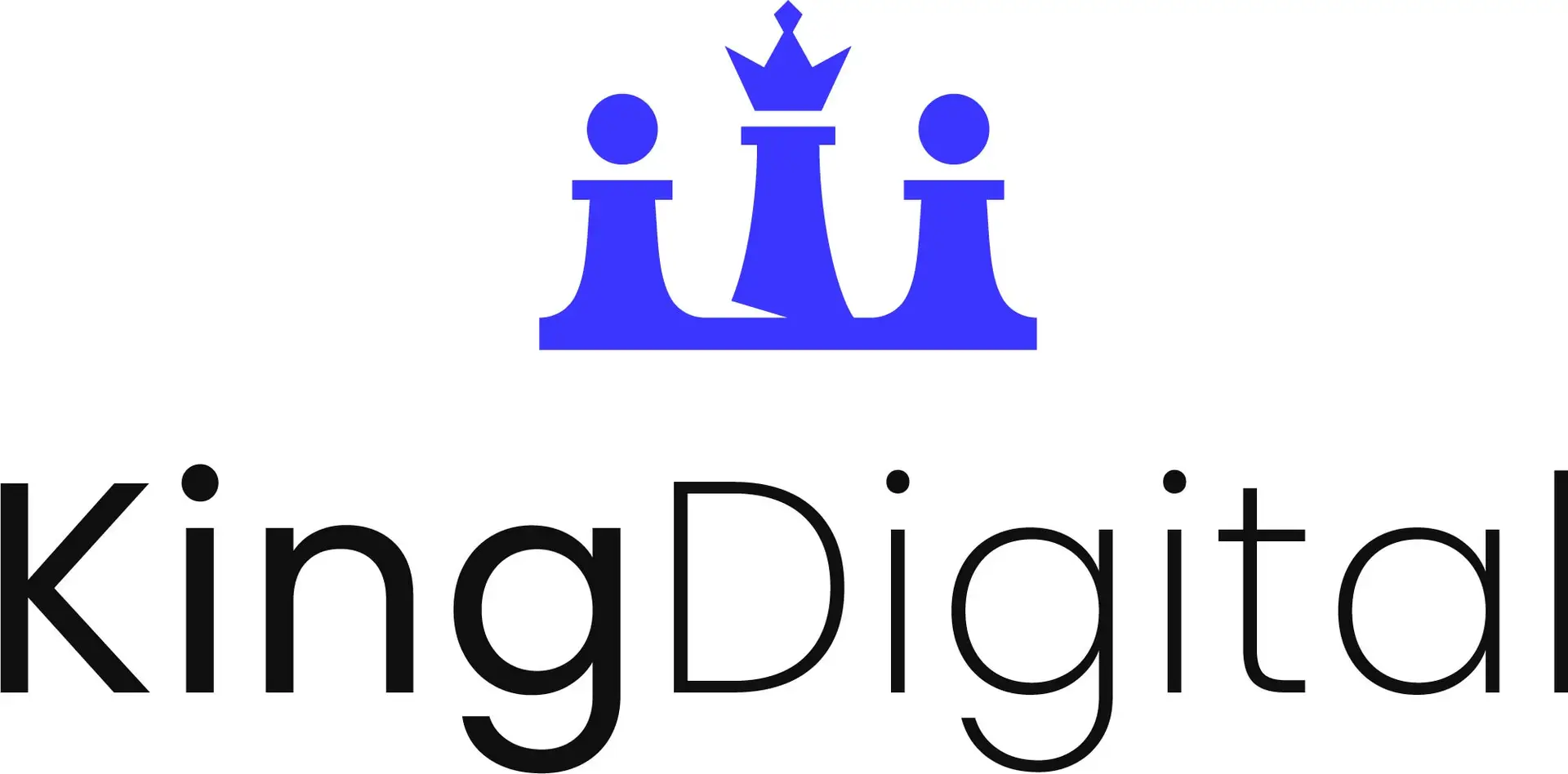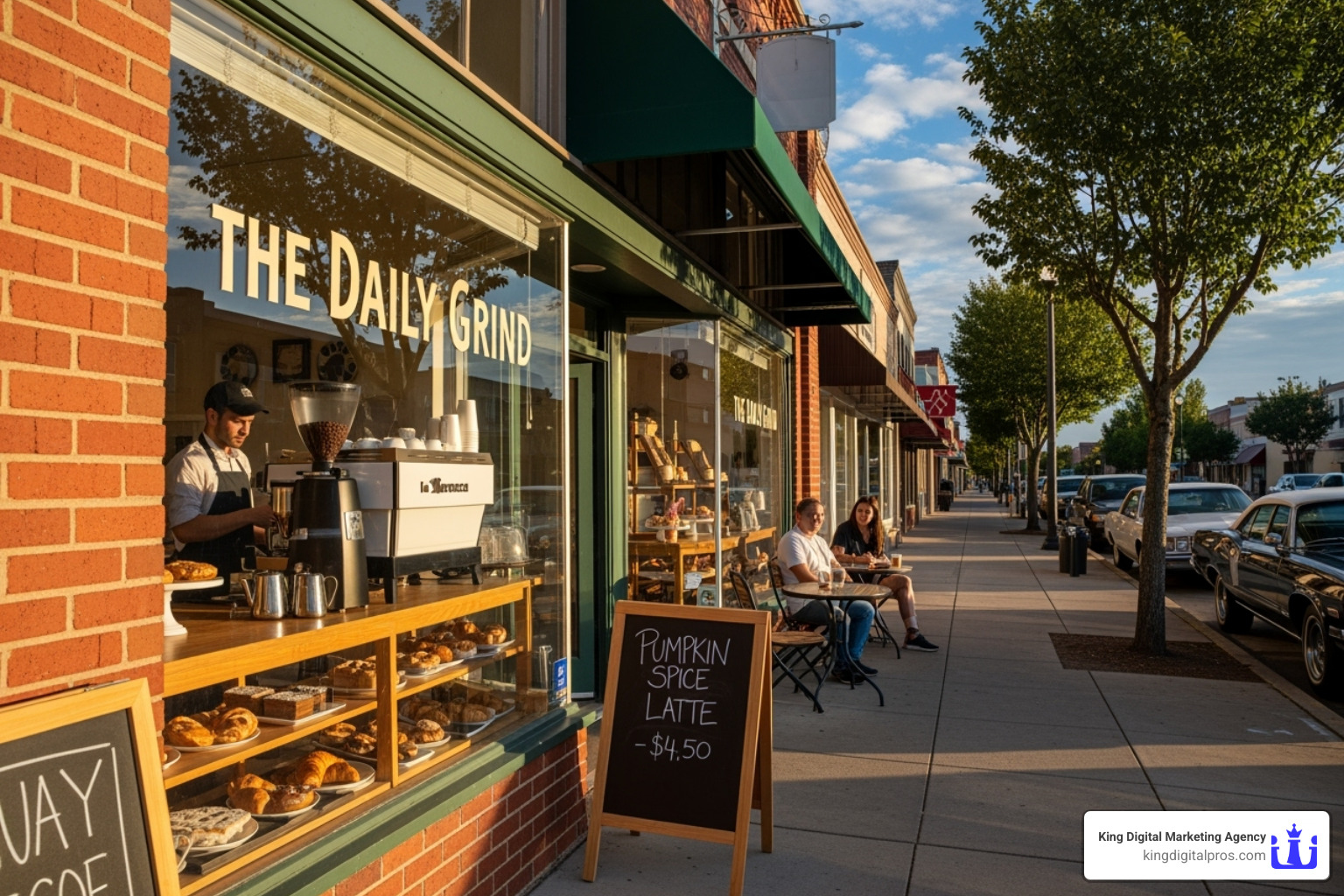Why Local SEO is Your Business’s Unfair Advantage
Local marketing SEO is the practice of optimizing your online presence to attract customers in your specific geographic area. It involves several key components:
- Google Business Profile optimization: Your digital storefront on Google Maps.
- Customer review management: Building trust and credibility.
- Local citations: Ensuring consistent business information across online directories.
- Location-based content: Creating website pages that target your service area.
- Local keyword targeting: Optimizing for “near me” and location-specific searches.
The numbers tell a compelling story. When people search locally, they’re ready to buy. A Statista survey found that 98% of U.S. consumers read online reviews for local businesses. These local searches convert at exceptionally high rates because they are driven by immediate need. When someone searches for “plumber near me,” they’re calling the first business that looks trustworthy.
Yet, many local businesses struggle with poor Google visibility and incorrect map listings. I’m Bernadette King, founder of King Digital Marketing Agency. I’ve spent years helping businesses dominate their local markets through strategic local marketing SEO. My approach transforms visibility challenges into sustainable growth by focusing on what truly moves the needle.
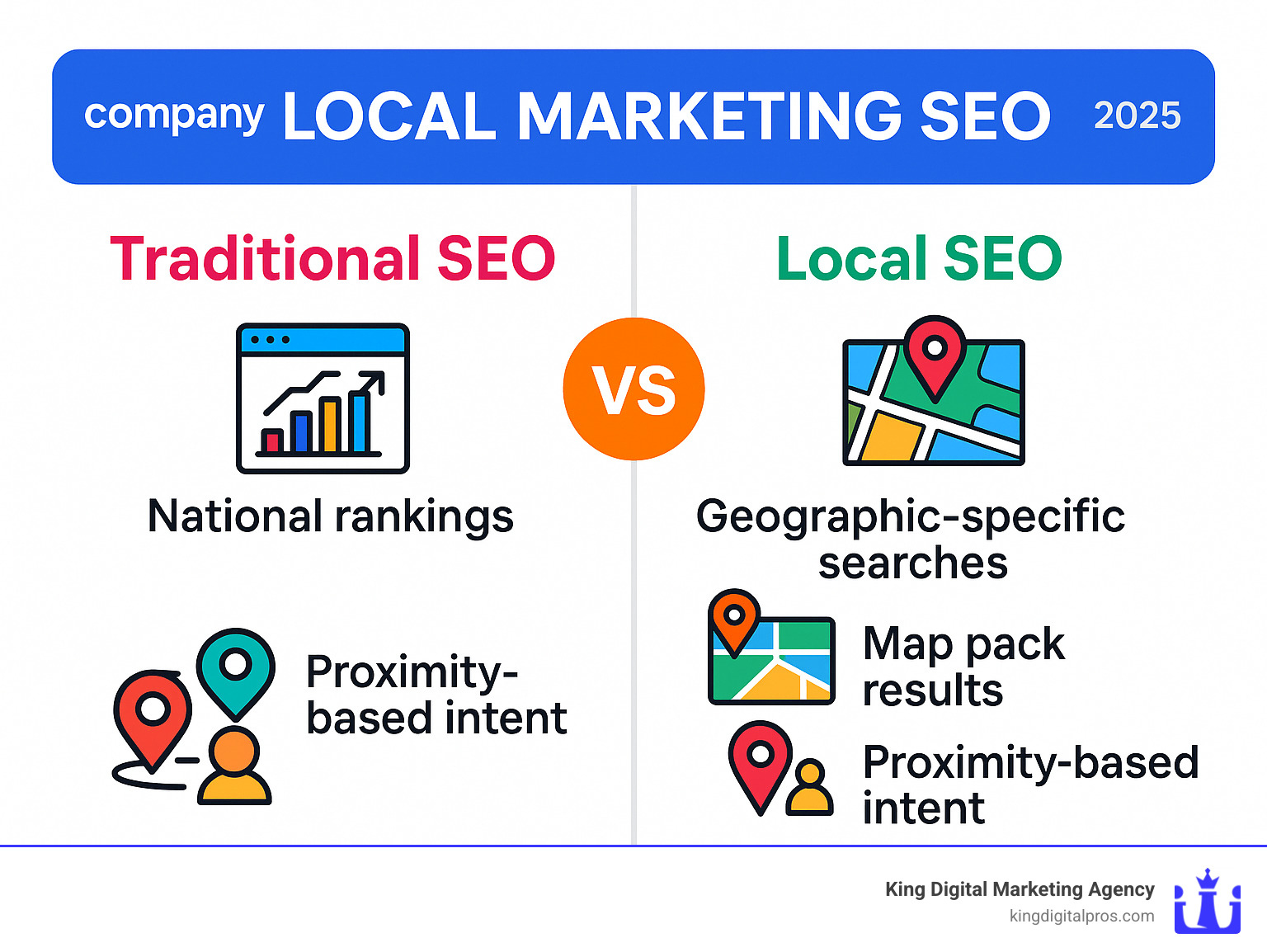
Relevant articles related to local marketing seo:
Mastering Your Digital Storefront: A Guide to Local Marketing SEO
When a potential customer searches for your service on their phone, Google acts as the matchmaker. Your success in local marketing SEO depends on three core factors: Relevance, Distance, and Prominence.
- Relevance is how well your business profile matches a search query. Complete and detailed information helps Google understand exactly what you offer.
- Distance is the proximity of your business to the searcher. A nearby business will naturally rank higher for “near me” searches.
- Prominence reflects how well-known your business is, based on factors like online reviews, ratings, and the number of quality websites linking to yours.
These three pillars work together to help Google connect you with the right customers.
Optimizing Your Google Business Profile
Your Google Business Profile (GBP) is your digital storefront and often a customer’s first impression. It’s a free and powerful tool.
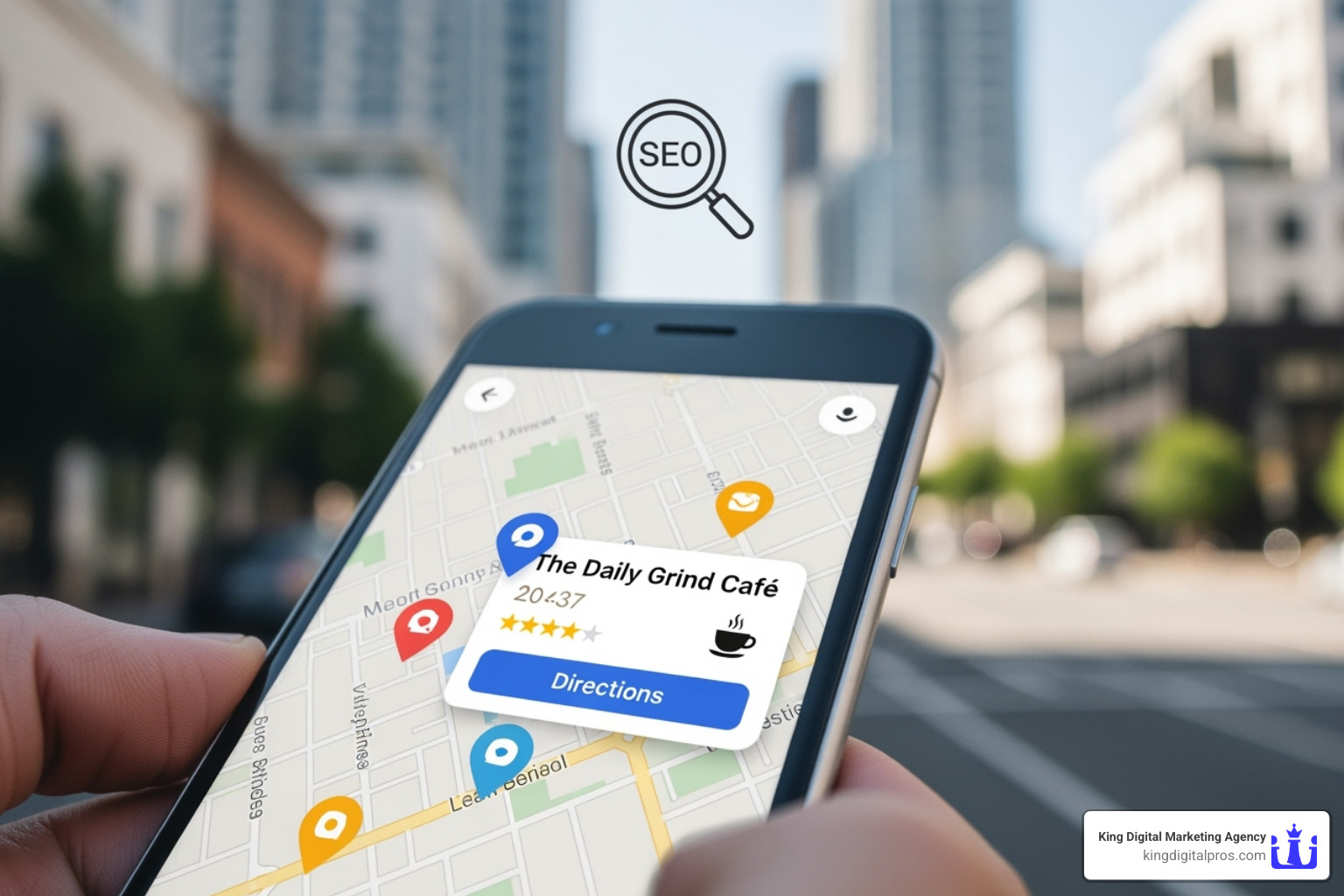
Start by claiming and verifying your profile. The process often involves receiving a postcard with a verification code. Next, ensure all your information – name, address, phone number (NAP), website, and hours – is complete and accurate. Even small discrepancies can harm your rankings. Be specific when choosing your business categories, selecting a primary category and adding relevant secondary ones to capture more search opportunities.
High-quality photos and videos are crucial; businesses that regularly add photos see significantly more direction requests and website clicks. Use Google Posts to share updates, offers, and events, signaling to Google that your business is active. Finally, use the Q&A feature to proactively answer common questions, providing helpful information and incorporating relevant keywords.
You can dive deeper into profile management at Manage your business on Google and explore our comprehensive approach to Google Business Page Management.
The Power of Customer Reviews and Reputation
Customer reviews are digital word-of-mouth and a powerful ranking signal. With 98% of people trusting online reviews, they directly influence customer decisions and your local marketing SEO.
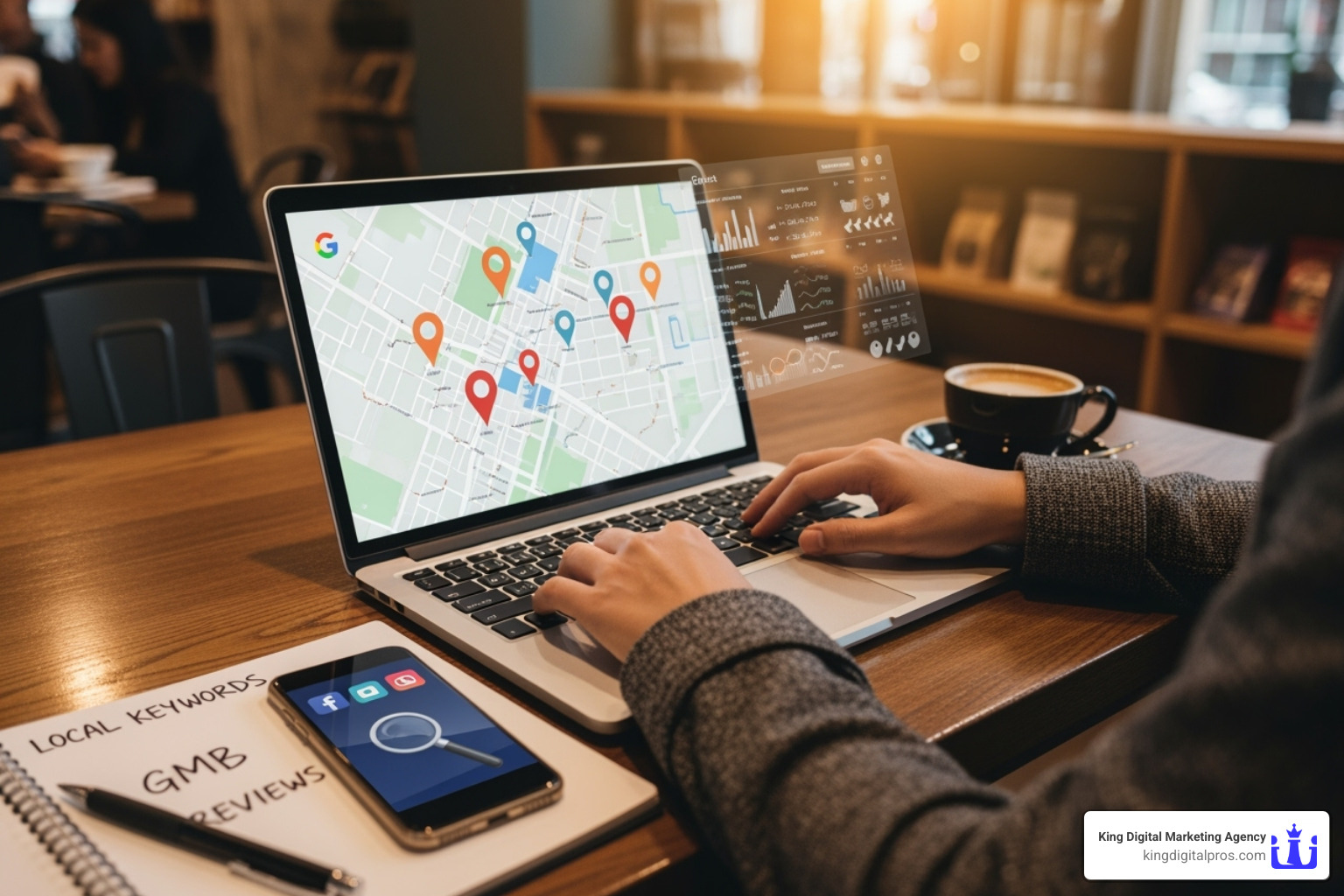
Encourage reviews by asking customers after a positive experience. Make it easy by providing a direct link to your Google review page. Respond to all reviews, both positive and negative. Thank customers for positive feedback and address negative comments professionally, offering to resolve issues offline. This demonstrates excellent customer service. A steady stream of new reviews, known as review velocity, signals to Google that your business consistently provides a great experience.
Learn more about maximizing your online reputation through our guide on Leveraging Your Reputation.
Building Trust with Local Citations
Local citations are online mentions of your business’s Name, Address, and Phone number (NAP). They create a web of trust signals across the internet. NAP consistency is critical for local marketing SEO; your business information must be identical everywhere. Inconsistencies confuse search engines and customers alike.
Citations can be structured (found in formal directories) or unstructured (mentions in blogs, news articles, etc.). Both contribute to your online prominence. Ensuring your information is correct with major data aggregators helps maintain consistency across hundreds of platforms.
Key local citation sources include:
- Google Business Profile
- Yelp
- Apple Maps
- Bing Places
- Yellow Pages
- Your local Chamber of Commerce
Building a strong citation profile is essential for establishing trust and authority in local search.
Building Your Local Footprint Beyond Google
While your Google Business Profile is crucial, your website is your digital headquarters. It’s where customers get to know your business and decide to contact you. A well-optimized website works 24/7 to build trust and convert visitors, but it must speak the local language that both Google and your neighbors understand.
The Core Pillars of Your Local Marketing SEO Strategy
Your website should feel like it was built specifically for your local customers. Every page should signal, “Yes, we’re right here in your neighborhood!”
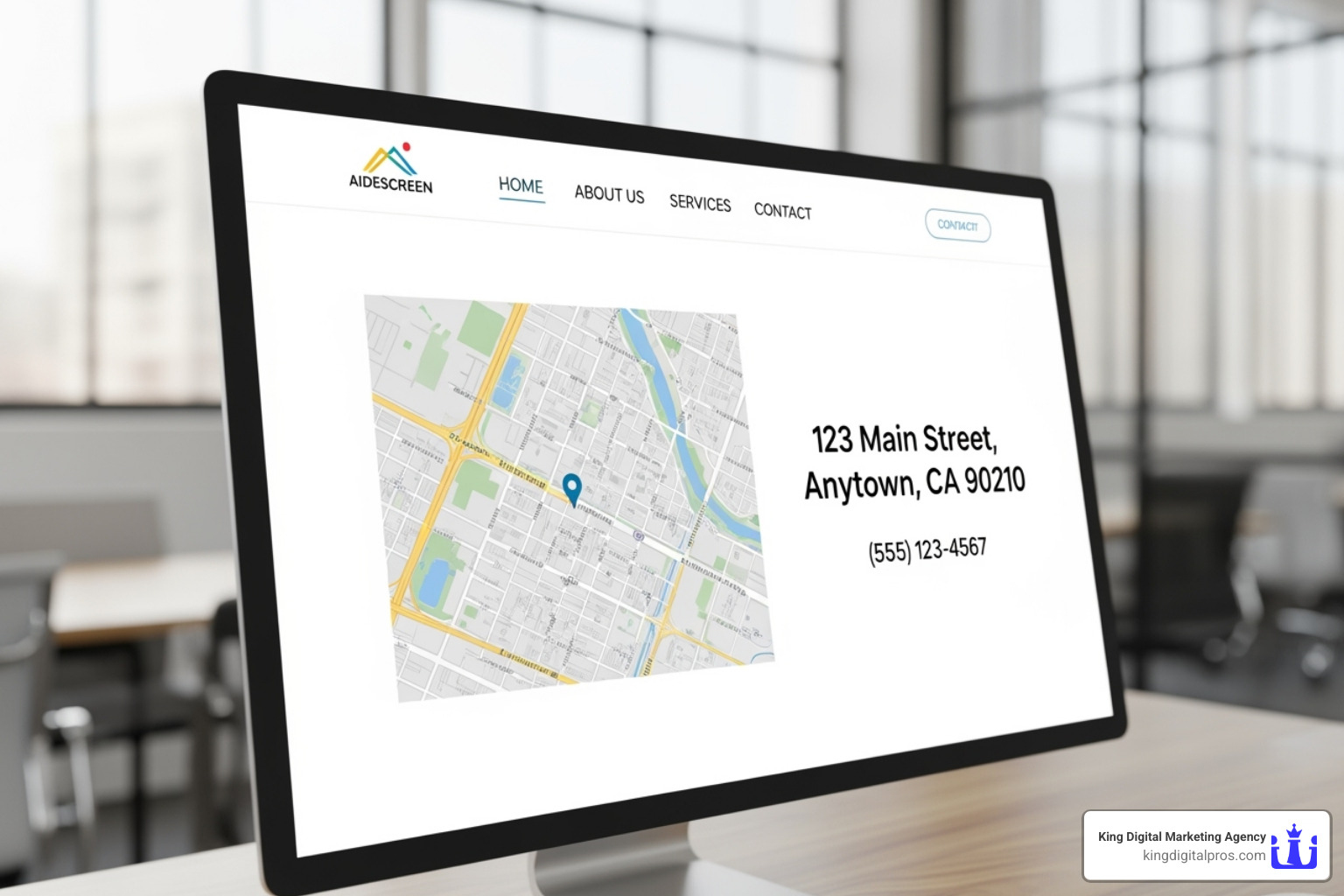
Geo-targeted keywords are your secret weapon. Instead of just “plumber,” you should strategically use phrases like “emergency plumber in downtown Albuquerque” or “family dentist near Santa Fe.” These specific terms attract high-intent customers. The rise of “near me” searches has also changed the game; Google prioritizes local results even when users don’t specify a location. Your job is to embed location signals throughout your content.
City-specific landing pages are essential if you serve multiple areas. A dedicated page for your Rio Rancho services, for example, tells Google exactly where you operate and gives customers relevant information. Also, embedding Google Maps on your contact page is a simple but powerful signal to visitors and search engines that you’re a real, physical business.
This all rests on solid on-page SEO. Your title tags, meta descriptions, and headers should include local keywords naturally. Crucially, your site must load quickly and be mobile-friendly, as most local searches happen on phones.
We dive deep into creating location-specific pages that convert: More info about Local SEO Location Pages.
Creating Content That Connects with Your Community
Your content should not only demonstrate expertise but also prove you’re part of the community. This is a huge opportunity many businesses miss.
- Blog about local events: Writing about the local farmers market or a downtown festival shows Google and customers that you’re locally engaged.
- Feature local partners: Highlighting a neighboring business or a nonprofit you support builds relationships and can lead to valuable backlinks.
- Create neighborhood guides: A veterinarian could write about dog-friendly parks in Albuquerque, positioning themselves as a local expert.
- Showcase local case studies: Stories of how you’ve helped neighbors build incredible trust and remove uncertainty for potential customers.
Focus on creating genuinely helpful content, and the local marketing SEO benefits will follow.
For guidance on finding the right local keywords: More info about Local SEO Keyword Research.
Earning Local Authority with Backlinks and PR
Local authority is about becoming so valuable to your community that other local websites want to link to you. These local backlinks are digital votes of confidence.
- Sponsor local events: Sponsoring a 5K run or a school program often earns you mentions on event websites and in local news.
- Partner with local nonprofits: Meaningful community involvement often leads to website mentions and authentic local presence.
- Guest post on local blogs: Share your expertise on local blogs to earn valuable backlinks and reach a new audience.
- Seek local press mentions: Local news outlets are always looking for stories. An innovative service or community contribution can earn powerful press.
This approach builds real relationships alongside your SEO, making you an integral part of your community’s ecosystem.
For a comprehensive look at why local backlinks matter, check out this resource: Moz: The Importance of Local Backlinks.
Advanced Local Marketing SEO: Thriving in the Age of AI
The world of local marketing SEO is changing rapidly, with artificial intelligence leading the charge. Customers are no longer typing simple keywords; they’re having conversations with their devices, asking questions like, “Where’s the best pizza place that’s still open near me?” This shift to conversational search requires a new approach.
The stakes for data accuracy have never been higher. If an AI system shares incorrect hours or location details, you could lose a customer permanently.
How AI is Reshaping the Local Search Landscape
AI is revolutionizing how customers find and choose local businesses. To stay ahead, you must understand these changes.
- AI-generated summaries: Google now often presents AI-powered overviews that pull information from your GBP, reviews, and website. Your information must be crystal clear and accurate to be included.
- Conversational search: As people use voice assistants more, content must be optimized to answer natural language questions, not just target keywords.
- Data trustworthiness: AI is only as good as the data it uses. Inconsistent information across different platforms can lead to AI sharing incorrect details, which reflects poorly on your business.
This is where Google’s E-E-A-T framework (Experience, Expertise, Authoritativeness, and Trustworthiness) is crucial. Demonstrating these qualities through accurate information, genuine reviews, and helpful content teaches AI that your business is a reliable recommendation.
For detailed guidance on maintaining your business information, check out the Google Business Profile Guidelines.
Integrating Social Media and Other Digital Channels
While Google is king, a smart local marketing SEO strategy includes other platforms where your customers spend time. Social media is a key channel for local findy and purchasing decisions.
- Community engagement: Use Facebook and Instagram to connect with your local audience by sharing updates on community events and showing the human side of your business.
- Localized advertising: Social media ads allow you to target promotions to people within a specific radius of your business, ensuring your message reaches potential customers.
- Video content: YouTube is the world’s second-largest search engine. Creating videos that showcase your business, share customer stories, or offer helpful tips can improve your visibility in video search results and provide rich content for AI systems.
Social media activity creates signals that search engines recognize as proof of an active, engaged business. According to Pew Research: Social Media Use in 2024, usage continues to evolve, offering new opportunities for local businesses to connect with their communities.
For a comprehensive look at how these digital channels work together: More info about Digital Marketing for Small Businesses.
Getting Started & Measuring Success
Ready to dive into local marketing SEO? It can feel overwhelming, but you don’t need to master everything at once. The key is to start with the fundamentals and build momentum. Even small improvements can yield significant results, often delivering visible changes within weeks.
Your 5-Step Local SEO Quick-Start Guide
This five-step roadmap is the foundation of every successful local SEO campaign we run at King Digital Marketing Agency:
- Claim & Optimize Your Google Business Profile: This is non-negotiable. Claim and verify your profile, then fill out every section completely. Profiles with more photos and complete information get significantly more clicks.
- Conduct a NAP Audit: Ensure your Name, Address, and Phone number are identical everywhere online – your website, Google, Yelp, Facebook, etc. Even minor inconsistencies can confuse Google.
- Start a Review Generation Campaign: Most happy customers won’t leave a review unless asked. Create a simple system to request reviews via email, QR codes, or in person, and provide a direct link.
- Optimize Your Homepage for Local Search: Your website should clearly state you’re a local business. Include your full address and phone number, mention your city and service areas, and use location-specific keywords in your title tags.
- Set Up Tracking: You can’t improve what you don’t measure. Install the free and powerful tools Google Analytics and Google Search Console to see how people find and interact with your business online.
How to Monitor Your Local SEO Performance
Tracking results is essential to understand what’s working. These tools and metrics will tell you the story of your performance.
- Google Search Console: Shows you which search terms bring visitors to your site and how often you appear in search results.
- Google Analytics: Reveals what visitors do once they’re on your site – do they call, fill out a form, or browse pages?
- Google Business Profile Insights: Provides direct feedback on your local visibility, including profile views, direction requests, and calls made directly from your listing.
- Local Pack Rankings: Use specialized tools to track your position in Google’s map results for your most important keywords.
The metrics that matter most for local marketing SEO tell a complete story of customer engagement:
| Metric | What It Tells You |
|---|---|
| GBP Views | Your overall visibility in local search and maps. |
| Direction Requests | The number of potential customers intending to visit your physical location. |
| Phone Calls | High-intent leads from customers ready to engage. |
| Website Clicks | Interest in learning more about your brand and services. |
| Review Rating & Count | The level of trust and social proof your business has built. |
| NAP Consistency | How confidently Google can recommend your business with accurate information. |
What’s great about local SEO is how quickly you can see real-world impact, connecting your online efforts directly to phone calls, store visits, and new customers.
Frequently Asked Questions about Local SEO
I’ve helped businesses with local marketing SEO for years, and a few questions always come up. Local search is constantly evolving, so let’s address the three most common concerns business owners have.
What’s the difference between local SEO and traditional SEO?
This is the most important distinction. Think of it this way: traditional SEO aims to make you the most popular business in the country, while local marketing SEO focuses on making you the go-to spot in your neighborhood.
- Traditional SEO targets a national or global audience with broad keywords (e.g., “marketing services”). The audience is often in the research phase.
- Local marketing SEO targets people in your specific area with location-based keywords (e.g., “marketing agency in Albuquerque”). These searchers have immediate intent and are ready to buy.
The strategies also differ. Traditional SEO leans on broad content and national backlinks. Local SEO centers on your Google Business Profile, customer reviews, local citations, and ranking in the Google Maps “local pack.”
How long does it take to see results from local SEO?
Results vary based on your starting point and competition, but here’s a typical timeline:
- Quick Wins (30-90 days): After optimizing your Google Business Profile and fixing NAP inconsistencies, you’ll often see more profile views, calls, and direction requests.
- Momentum (3-6 months): As your review campaigns and citation building take effect, you’ll start ranking for less competitive keywords and see a noticeable improvement in visibility.
- Market Dominance (6-12+ months): Achieving top rankings for competitive local keywords requires sustained effort. It takes time for Google to fully trust your authority.
Local SEO is like planting a tree; with consistent care, it will provide lasting value.
Can I do local SEO myself, or should I hire an agency?
This is a practical question. You can certainly handle some basics yourself.
- DIY Basics: Claiming your Google Business Profile, uploading photos, responding to reviews, and ensuring your address is consistent are all tasks a motivated business owner can tackle. In a market with low competition, this might be enough.
- When to Hire an Agency: As you dig deeper, the complexity increases. Technical SEO, content strategy, citation building, and monitoring algorithm changes are time-consuming and require specialized knowledge.
The real question is about opportunity cost. Every hour you spend on SEO is an hour you’re not running your business. At King Digital Marketing Agency, we bring specialized experience to manage your local search strategy, freeing you to focus on what you do best. The choice depends on your time, technical comfort, and competitive landscape, but your competitors may already be working with professionals.
Conclusion: Partner with Experts for Sustainable Growth
The digital landscape has changed how customers find local businesses. Your local marketing SEO strategy is the essential bridge connecting your services to the customers who need them now.
We’ve covered the core elements of a successful strategy: optimizing your Google Business Profile, building trust through reviews and citations, and creating content that resonates with your community. Adapting to an AI-driven future, where data accuracy and trustworthiness are paramount, is no longer optional.
The future of local search will be defined by AI-powered results, voice search, and social signals. Businesses that accept these changes will capture the majority of local customers. Local marketing SEO is a holistic approach; it’s about creating a seamless online presence that makes it effortless for customers to choose you.
At King Digital Marketing Agency, we’ve seen this change firsthand, helping businesses become household names in their communities. We handle the technical complexities and stay ahead of algorithm changes so you can focus on serving your customers.
Ready to transform your local visibility and attract more customers? Explore our Local SEO Services and let’s build your digital success story together.
